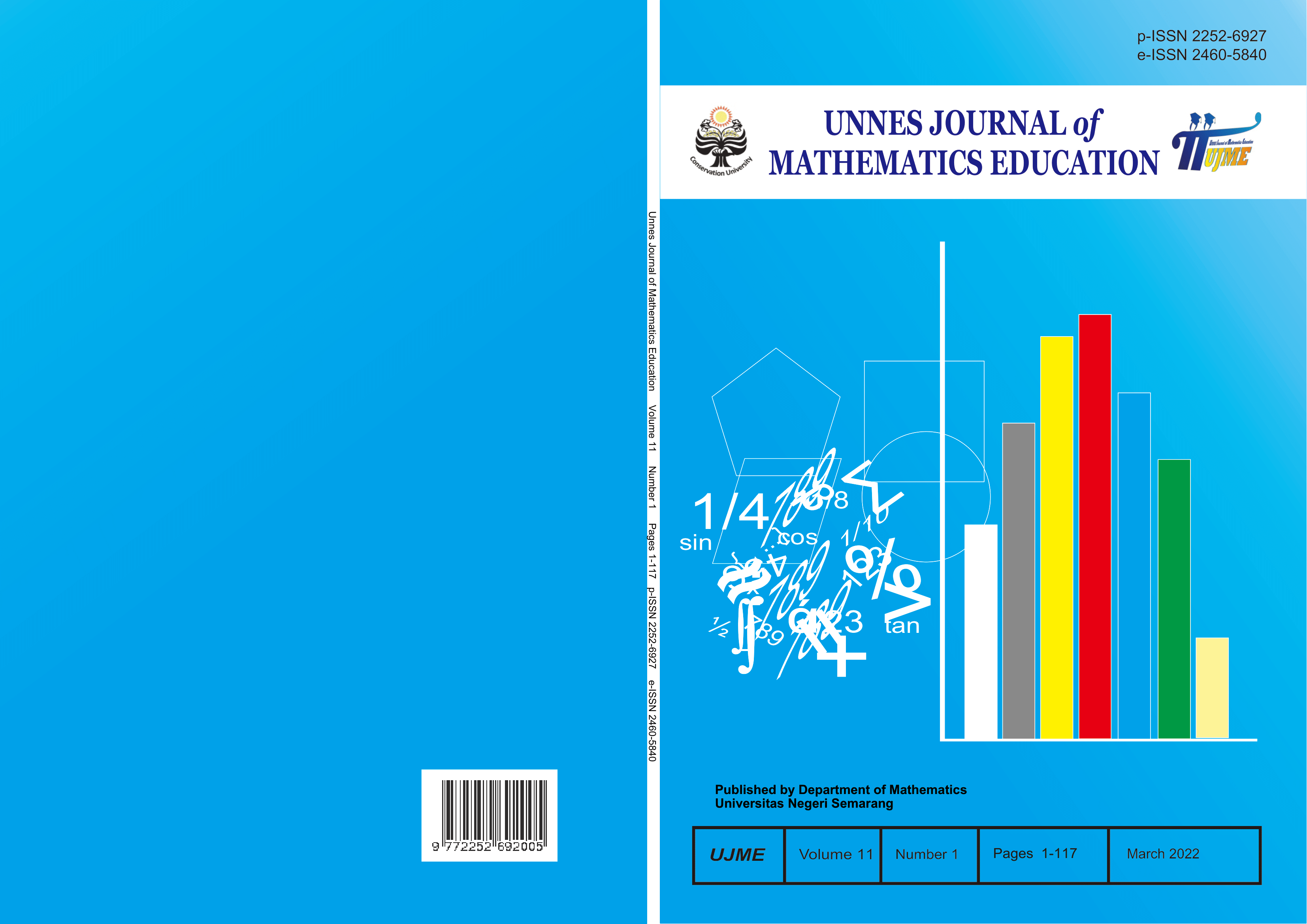Mathematical Problem Solving Skills Reviewed from Students’ Metacognition Performance in Online-Based PME Learning Model
##plugins.themes.academic_pro.article.main##
Abstract
This research was carried out with the aim of knowing: (1) whether students' mathematical problem solving abilities in the online-based PME learning model achieved classical learning completeness; (2) is the average mathematical problem solving ability in the online-based PME learning model better than the online-based expository learning model; (3) is there any effect of metacognition performance on students' mathematical problem solving abilities in online-based PME learning models; (4) how is the description of mathematical problem solving abilities in terms of the metacognitive performance of Vocational High Schools Perdana Semarang students on the online-based PME learning model. This research uses the mix method. This research is a Quasi Experimental Design with Pre-Test-Post-Test Control Group Design. The population of this research is all students of class XI Vocational High Schools Perdana Semarang. The results of this study indicate that: (1) students' mathematical problem solving abilities in the online based PME learning model can achieve classical learning completeness; (2) the average mathematical problem solving ability of students in the online-based PME learning model is better than the online-based expository learning model; (3) there is a positive influence on the level of metacognition performance on students' mathematical problem solving abilities in the online PME learning model; (4) students with high metacognition performance have better mathematical problem solving abilities than students with moderate and low metacognition performance levels, then students with moderate metacognition performance have better mathematical problem solving abilities than students with low metacognition performance levels.
##plugins.themes.academic_pro.article.details##
References
Amin, I & Mariani, S. (2017). PME Learning Model : The Conceptual Theoretical Study of Metacognition Learning in Mathematics Problem Solving Based on Constructivism. Journal IEJME-Mathematics Education, 12(4), 333–352.
Amin, I, Waluya, S. B, & Mariani, S. (2018). Metacognitive Strategy and Problem Solving Ability on Mathematics Teaching-Learning Process of High School Students. Journal Semarang State University, Semarang, 2, 14–26.
Astutiani, Risma, Isnarto, dan Isti Hidayah. (2019). Kemampuan Pemecahan Masalah Matematika dalam Menyelesaikan Soal Cerita Berdasarkan Langkah Polya. Seminar Nasional Pascasarjana. Tersedia di https://proceeding.unnes.ac.id/index.php/snpasca/article/view/294/277.
Chairani, Zahra. (2016). Metakognisi Siswa dalam Pemecahan Masalah Matematika. Yogyakarta: CV Budi Utama.
Davita, Putri Wulan Clara, dan Heni Pujiastuti. (2020). Anallisis Kemampuan Pemecahan Masalah Matematika Ditinjau dari Gender. Kreano, Jurnal Matematika Kreatif-Inovatif 11(1): 110–17. Tersedia di https://journal.unnes.ac.id/nju/index.php/kreano/article/view/23601/10393.
Izzati, L. R., & Mahmudi, A. (2018). The Influence of Metacognition in Mathematical Problem Solving. Journal of Physics: Conference Series, 1097(1). Tersedia di https://doi.org/10.1088/1742-6596/1097/1/012107
Kamarullah. (2017). Pendidikan Matematika di Sekolah Kita. Al Khawarizmi: Jurnal Pendidikan dan Pembelajaran Matematika, 1(1), 21. Tersedia di https://doi.org/10.22373/jppm.v1i1.1729
Kozikoglu, I. (2019). Investigating Critical Thinking in Prospective Teachers: Metacognitive Skills, Problem Solving Skills and Academic Self-Efficacy. Journal of Social Studies Education Research, 10(2), 111–130. Tersedia di https://www.learntechlib.org/p/216567/
Kuzle, Ana. (2013). Patterns of Metacognitive Behavior during Mathematics Problem-Solving in a Dynamic Geometry Environment. International Electronic Journal of Mathematics Education 8(1): 20–40. Tersedia di https://www.iejme.com/download/patterns-of-metacognitive-behavior-during-mathematics-problem-solving-in-a-dynamic-geometry.pdf.
Meika, I., Ramadina, I., Sujana, A., & Mauladaniyati, R. (2021). Kemampuan Pemecahan Masalah Matematis Siswa Dengan Menggunakan Model Pembelajaran SSCS. Jurnal Cendekia: Jurnal Pendidikan Matematika Volumear Nasional Pendidikan Matematika, 05(01). Tersedia di https://j-cup.org/index.php/cendekia/article/view/388/266
Mustakim. (2020). Efektivitas Pembelajaran Daring Menggunakan Media Online Selama Pandemi Covid-19 pada Mata Pelajaran Matematika. Al asma: Journal of Islamic Education 2(1): 1–12. Tersedia di https://core.ac.uk/download/pdf/327171961.pdf .
Ozcan, Z. C., & Gumus, A. E. (2019). A Modeling Study to Explain Mathematical Problem-Solving Performance Through Metacognition, Self-Efficacy, Motivation, and Anxiety. Australian Journal of Education, 63(1), 116–134. Tersedia di https://doi.org/10.1177/0004944119840073
Pujiadi. (2016). Kurikulum matematika 2 dan pemanfaatan media pembelajaran. Jakarta: Kemendikbud. Tersedia di https://docplayer.info/31986536-Kelompok-kompetensi-h-kurikulum-matematika-2-dan-pemanfaatan-media-pembelajaran.html
Rukminingsih, Adnan, G., & Latief, M. A. (2020). Metode Penelitian Pendidikan. Penelitian Kuantitatif, Penelitian Kualitatif, Penelitian Tindakan Kelas. Yogyakarta: Erhaka Utama.
Sandewa, F. (2018). Faktor-Faktor yang Mempengaruhi Kinerja Pegawai di Kabupaten Banggai Kepulauan. Jurnal Ilmiah Clean Government, 1(2). Tersedia di https://core.ac.uk/download/pdf/230961575.pdf
Siagian, M. V., Saragih, S., & Sinaga, B. (2019). Development of Learning Materials Oriented on Problem-Based Learning Model to Improve Students’ Mathematical Problem Solving Ability and Metacognition Ability. International Electronic Journal of Mathematics Education, 14(2), 331–340. Tersedia di https://doi.org/10.29333/iejme/5717
